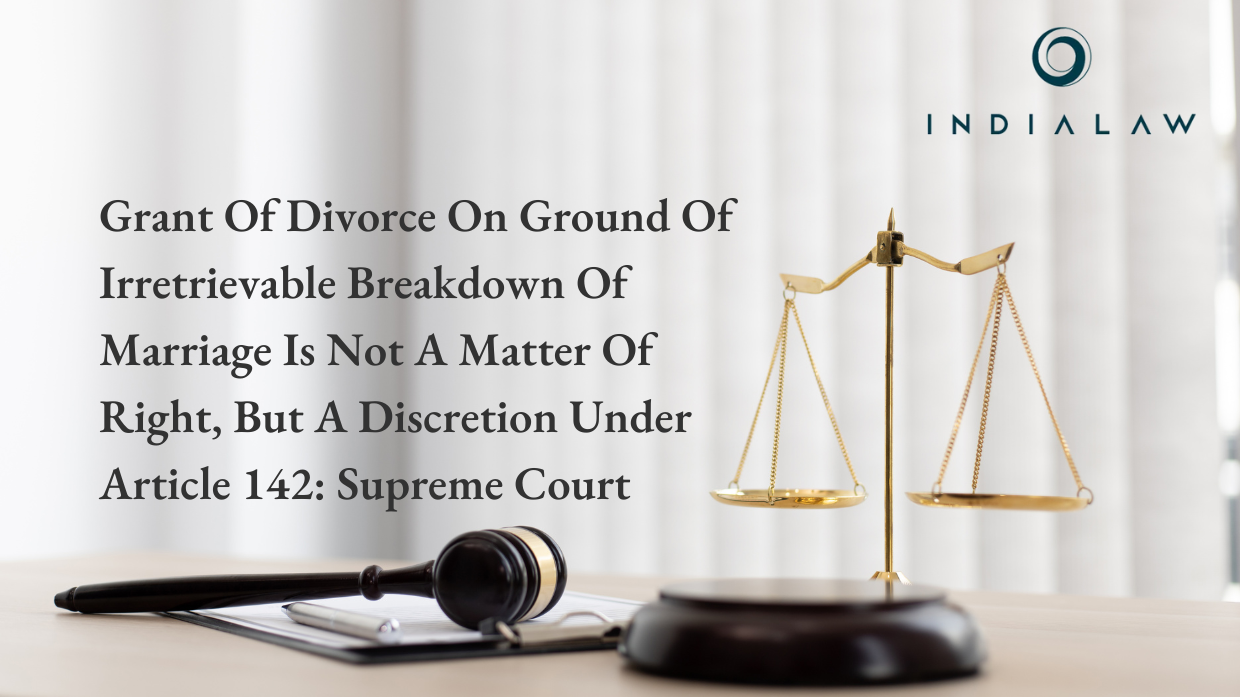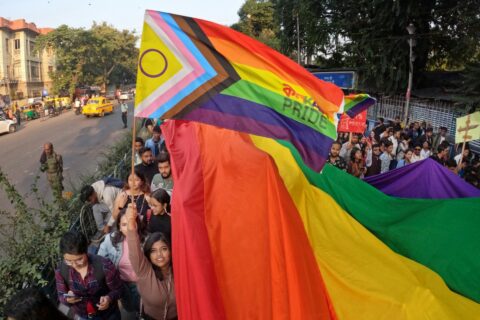Grant Of Divorce On Ground Of Irretrievable Breakdown Of Marriage Is Not A Matter Of Right, But A Discretion Under Article 142: Supreme Court

The Constitutional bench of the Hon’ble Supreme Court (SC)[1] recently held that Article 142(1) of the Constitution of India can be invoked to depart from the procedure and statutory provisions of law to establish ‘complete justice’ between the parties. In consonance to the power under Article 142, the SC has exercised its discretion to dissolve the marriage on the ground of ‘Irretrievable Breakdown of Marriage’.
In 2014, parties approached SC seeking divorce on grounds of ‘Irretrievable Breakdown of Marriage’, the ground which is not statutorily recognized under the Hindu Marriage Act (HMA). Nevertheless, the SC granted them a divorce in 2015. However, the Court acknowledged the existence of numerous similar petitions awaiting resolution, prompting them to keep the case pending. The primary objective was to address the crucial question which was to determine the applicability of Article 142 for exercising discretionary power to dissolve the marriage on the ground of ‘Irretrievable Breakdown of Marriage’. Therefore, the matter was referred to a Constitution Bench in June 2016.
The Constitutional bench of SC examined the following issues:
- SCOPE AND AMBIT OF POWER AND JURISDICTION OF SC UNDER ARTICLE 142;
The Bench observed that the SC possesses the exclusive authority granted under Article 142 to ensure fairness, equality, and moral righteousness. Article 142 is a distinctive provision that empowers the SC to administer “complete justice” in any legal dispute or subject. Consequently, the SC may surpass the boundaries imposed by procedural and substantive law in order to achieve the ultimate objectives of justice. Nevertheless, the Bench also emphasized the need for exercising such authority with appropriate restraint.
They stated that the powers conferred by Article 142 should be responsibly exercised while safeguarding the “fundamental general and specific principles.” Specific public policy principles, on the other hand, should be comprehended as those explicitly articulated in a statute (HMA). A statute cannot be interpreted in a way that fundamental principles are breached.
The bench also acknowledged that the power vested in Article 142 carries inherent limitations and constraints. It asserted that when exercising power under Article 142:
- The court must not overlook the substantive rights of a litigant as granted by the existing legal framework;
- The power cannot be utilized to supplant the substantive law that is applicable to a particular case;
- Explicit provisions stated in statutes cannot be disregarded;
- The court cannot exercise its jurisdiction in a manner that violates the law;
- CAN SC EXERCISE POWER UNDER ARTICLE 142(1) TO GRANT A DECREE OF DIVORCE BY MUTUAL CONSENT FROM THE PROCEDURE AND STATUTORY PROVISIONS, AND ALSO QUASH AND DISPOSE OF OTHER/CONNECTED PROCEEDINGS? MOREOVER, IN WHICH CASES AND UNDER WHAT CIRCUMSTANCES SHOULD SC EXERCISE JURISDICTION UNDER ARTICLE 142(1);
Section 13B of the Hindu Marriage Act, 1955 (HMA), outlines the process for divorce by mutual consent between both parties. This entails a mandatory cooling-off period of 6 to 18 months following the joint application for divorce. If the application remains unwithdrawn during this period, the relevant court will proceed with the case and grant the divorce. However, the Bench affirmed that the SC, exercising its authority under Article 142, is not bound by these procedural requirements.
It retains the power to grant the divorce decree before the prescribed cooling-off period, even if the primary case is pending before a Family Court. Moreover, in the pursuit of justice, the SC can also grant a divorce based on the grounds of an ‘irretrievable breakdown,’ regardless of opposition from one party.
The Bench further held that the cooling-off period poses a hindrance in cases where there is an ‘irretrievable breakdown of marriage,’ indicating an unavoidable divorce. Nevertheless, they stressed the significance of the time gap as it provides an opportunity for the parties to assess and reconsider their decision to end the marriage. The period may only be waived when the Court determines that the marital relationship is irreparable.
In certain extraordinary cases, the Supreme Court has observed the presence of exceptional hardships, where couples embroiled in acrimonious litigation and enduring prolonged suffering seek to start afresh by jointly requesting the court to dissolve their marriage. These are situations marked by irreconcilable differences, grave allegations, and multiple litigations, making the continuation of the marital relationship an impossibility. In such circumstances, the bench noted that the mandatory cooling-off period of six months, intended to prevent rushed decisions, only causes further misery without any real benefits. Therefore, a formal decree of divorce should be granted, acknowledging that the marriage had effectively ended much earlier in practice.
The bench also clarified that none of the party has the right to move before the SC directly to seek divorce claiming “irretrievable breakdown of marriage” even though the SC alone has the discretionary powers under Article 142 to dissolve a marriage that has broken down irretrievably. A writ petition under Article 32 or Article 226 of the Constitution of India should never have been directly filed by the parties, and divorce on grounds of irretrievable breakdown of the marriage on the basis of such attempt should be spurned and rejected.
Both procedural and substantive laws may be disregarded by Court, provided that the decision is made in accordance with fundamental general and particular public policy considerations. The Court has the discretion to dissolve the marriage by granting divorce by mutual consent in light of a settlement between the parties without being constrained by the formal requirement to move the second motion. In addition, the SC has the authority under Article 142(1) to revoke and annul other orders and proceedings, including criminal proceedings.
The Court does act as a problem solver by balancing out the equities between the conflicting claims, but when deciding whether to exercise discretion, the Court must also take into account the substantive provisions as enacted and not ignore them. The authority can only be used for a “cause or matter.”
[1] SHILPA SAILESH v/s VARUN SREENIVASAN (TRANSFER PETITION (CIVIL) NO. 1118 OF 2014)
By entering the email address you agree to our Privacy Policy.



